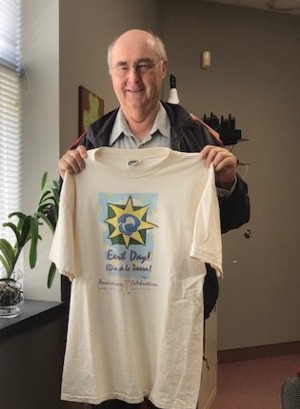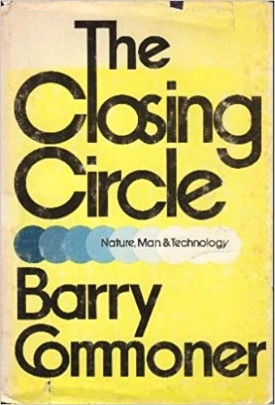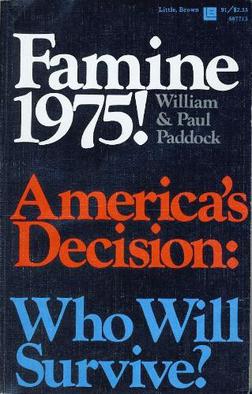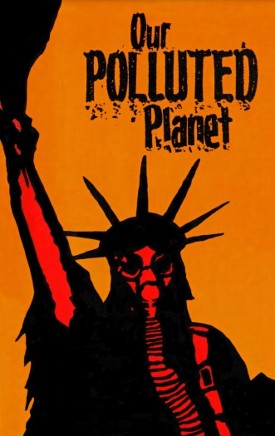Earth Day Versus the Eco-Warriors
By Neil Earle
 Earth Day 25 Souvenir – Neil was there!
Earth Day 25 Souvenir – Neil was there!The Chinese call them the Nine Sloughs – an extended period of “heavy weather” and natural disasters tied to the drop in global temperatures after 1270. It ended what scholars call the Medieval Warm Period when enterprising Vikings could land in northern Newfoundland after farming parts of coastal Greenland.
The year 1295 in China saw the first of these “climatic slumps” that would mark the end of the Mongol Yuan Dynasty in a series of dramatic recurrences of floods, famines, and earthquakes that helped soften the population through malnutrition to set up major epidemics in the 1340s. “The changes in ecology are liable to have forced sudden changes in the population migration of rodents and the fleas they bore,” writes Johnathan Clements in his Brief History of China. This was “liable to have had some bearing on the spread of the Black Death (p. 182).”
Climate and History
“Ecology,” A nice word, that. From the Greek “eikos” or “household” alluding to the fact of interconnection – that what happens in one part of a system can affect another. I wish we could hear it used more often as energetic activists lay out massive plans to overhaul…gasp…the planet! As a history teacher I am aware that climate is an important factor in history as are even localized weather patterns. These can range from the Russian winter shutting down Napoleon’s Grand Army in 1812 to the unusual low tides that made possible the D-Day invasion of 1944 to the sandstorm that ended an attempted rescue of American hostages in Iran in 1980.
We’re in a Coronavirus crisis right now echoing the Spanish flu of 1918-1919 which took one and one quarter years to get over and took 650,000 American lives and at least 50 million worldwide. That last great pandemic may be tied to a fatal combination of bird migration patterns and hog farming in rural Kansas, according to the Smithsonian magazine of November, 1917. Climate, weather, ecology – what we used to call environmental issues have been a staple of our global experience since the 1970s.
I know. I’ve been involved as a journalist and a protest marcher. My earliest days as a college editor in England with a “Rivers of Death” lead article got me in trouble in 1970. (England survived!) In 1993 I authored “Environmental Matters Matter” to a skeptical Yuppie audience. In 2017 we marched in Duarte, CA to try and stop a Fortune 500 company from mining a mountain for rock (!) behind our home town (we lost). Visiting beautiful Santa Barbara in 1994 my wife and I hit the town just in time for the 25th anniversary of Earth Day in 1994 (and have the tee shirt to prove it).
In short, I know that caring for the environment is a truly worthwhile project, one that unites farmers and office workers and is dear to the heart of Canadians such as myself. The sad thing is how this naturally healthy desire has become sadly distorted by the almighty tussle in public debate about the messianic overtones attaching to climate change. Did common sense somewhere disappear along the way?
 The Closing Circle (Dr Commoner’s book – fine man but poor prophet).
The Closing Circle (Dr Commoner’s book – fine man but poor prophet).Apathy and Panic
A wit has said that in North America we operate at two speeds – apathy and panic. If you don’t subscribe to every chapter and verse of the Climate Change hymn book you are considered a Neanderthal in many circles. You’re often considered to be a calloused uncaring moral pygmy who doesn’t care about the future of the planet and generations yet to come.
Living in California for 23 years we were close enough to the Sierras to see fires smoldering on the hills back of our house. Climate change? Well…we studied the subject to learn there were at least four or five causes to the fires. Warmer weather is part of it, a nod to climate change there. But there were 214.9 million dead trees and remains that needed clearing in the state, firewood lying around which prove prime kindling in dry seasons. Uncontrolled infestation also weakens healthy trees and removes protective bark. There is the fact that modern “eco-extreme” tactics won’t let forests be cleared and trimmed to remove hazards from lightning strikes. “Tending the garden” some savvy environmentalists call it.
Finally, no one wants to mention runaway development – people wanting to live in crazy hill zones for the view and almost sure to be cut off in a disaster. This almost happened to a friend of mine in the Bear Lake area several years back when chips were falling on our suburbs as big as the palm of my hand.
Now we have people who would eliminate a host of modern conveniences (except their Twitter accounts, presumably), and would lead us into a world heated and fueled by wood and stoves which could finally devastate the forests and the planet’s “lungs” for good.
What’s surprising is the number of “responsible” public officials willing to subscribe to such a grand and totalizing scheme.
Meanwhile, something in all of us small-town/suburban folk revolts at the sight of an empty box of beer bottles littering up a rural road. There are a host of rejuvenating experiences conjured up when I hear ads for web sites such as “discover the forest.org.” Ah, the forest! The domain of friendly forest rangers I knew after five summers in the gorgeous Minnesota wilderness.
Environmentalism? OK! Utopian climate change solutions? Let’s proceed carefully.
 Famine 1975 by Paul Paddock. (No! It didn’t happen!)
Famine 1975 by Paul Paddock. (No! It didn’t happen!)Failed Apocalypses
Critics of The Coming Ecological Apocalypse cannot easily forget how in the 1960s and 1970s the worry of many public intellectuals was the exact opposite of the global warming thesis that lasted till the 1990s. The 1970s feared a coming ice age. Respected scientists I read and admired such as Dr. Barry Commoner in The Closing Circle warned that global cooling would shorten growing seasons and lead to global famines and epidemics (as did happen in the 1300s).
How well I remember another book Famine 1975 catching lots of attention and particularly worried about places like India. In the 1960s America engineered the greatest peacetime armada in history to help feed India and now…India exports grain! A tricky thing, the climate.
I vividly remember Paul Ehrlich’s 1970 book The Population Bomb warning of starvation of which Ehrlich was so certain that he had himself sterilized! And urged governments to inflict the remedy on their citizens. He’s still here, thankfully, and so are all of us.
There’s sincerity for you but so far none of these secular apocalypses has worked out. The experts can get it wrong. And how! Remember Y2K? Another parable in the long sad history of Doomsday Around the Corner – NOT! The experts often get it wrong – badly.
I myself worried about many of these trends and wrote and spoke about them often. The church I supported put out a booklet simply titled “Pollution” in 1968 that went out by the truckload. Such things as the Club of Rome calling for Reshaping the Global Order were texts I carried around and lectured from in the 1970s.
 Church publication from 50 years ago sounded the alarm on pollution.
Church publication from 50 years ago sounded the alarm on pollution.Science Without God?
Climate Change has definitely impacted history. I have to teach the Black Death each semester. Now Carbon Dioxide levels are fueling more fears. George Carlin had a funny (if profane) routine about our puny human efforts to save the planet. Like Canadian philosopher Jordan Peterson he urged today’s would-be revolutionaries to begin by cleaning up their room! Which has more merit than we might suspect.
There is wisdom in the thoughts of Dr. Michael Peterson at the University of Delaware’s Community Health Sciences Division that there is much in this “saving the planet” credo that has a disturbingly radical overtone to it. Some pastors have similar worries. Where is God in all this? Hasn’t Jesus already saved the planet, in the understanding of many Christians? No, we can’t “leave it all to God” as we face very real challenges but the slogan “our problems are man-made and therefore can be solved by man” was touted in the secular 1960s. But how did that all work out?
The basic Judeo-Christian text that was once used to guide much of our social thinking on matters from prison reform to anti-slavery taught us as far back as the Book of Genesis that we live in a world where exists in equal measure “the knowledge of good and evil.” That insight seems up to date. “It goes against our human nature to accept that we are not in total control of our lives and climate,” claimed Dr. Peterson some time back when an overheating planet was being posited. “The global warming message espoused in the popular culture is one that promotes a view that man, and man alone, is in control of this planet.”
Is this where the Science has led us? A Kingdom of God without God? The times call for caution. Early models for Corona Virus tracking proved woefully and perhaps disastrously inaccurate. Remember? We heard that 2.2 million might die in the North Atlantic area! Whhhaaaaatttt!!! I’ll still teach how climate can affect history but practice a healthier, more realistic environmentalism, a more localized “hands on” strategy where we stoop to pick up trash and join in on some Community Clean Up projects. Doing practical good. Reshaping the planet seems, at least at this stage, above my pay grade. But I’ll march with you to genuinely save a forest or an aquifier anytime.